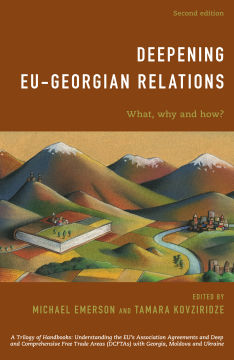
Additional Information
Book Details
Abstract
For Georgia, the signing of the Association Agreement and the DCFTA with the European Union in 2014 was an act of strategic geopolitical significance. Of all the EU’s eastern partners, the country has distinguished itself since the Rose Revolution of 2003 by pushing ahead with a radical liberalisation and economic reform agenda. Georgia is also unique among the countries in the region for having largely cleansed its economy and political system of corruption.
The purpose of this Handbook is to make the complex political, economic and legal content of the Association Agreement readily understandable. This second edition, published two years into the Agreement’s implementation, adds new value. The Handbook now reflects Georgia’s progress in putting the Agreement into effect.
Two teams of researchers from leading independent think tanks, CEPS in Brussels and Reformatics in Tbilisi, collaborated on this project, with the support of the Swedish International Development Agency (Sida). This Handbook is one of a trilogy examining similar Association Agreements made by the EU with Ukraine and Moldova.
Michael Emerson is Associate Senior Research Fellow at the Centre for European Policy Studies in Brussels.
Tamara Kovziridze is co-founder of Reformatics in Tbilisi.
These Handbooks offer a one-stop guide to the Association Agreements – the authors have painstakingly analysed the incredibly complex Agreements to deliver a compact and accessible overview to all those who need to grasp their contents. The national teams also shed light on the salience of the content for domestic reforms. Even though the Handbooks are not meant to be read like a book, the reader who does so is rewarded with a panoramic overview of the sheer scale and ambition of the AA-DCFTA. The Handbooks offer a plethora of pivotal insights into the Agreements while at the same time they throw up a number of important questions. A ‘bible’.
Kataryna Wolczuk, Centre for Russian, European and Eurasian Studies, University of Birmingham
Table of Contents
| Section Title | Page | Action | Price |
|---|---|---|---|
| Deepening EU–Georgian Relations | Cover | ||
| CONTENTS | v | ||
| List of Tables, Figures and Boxes | vi | ||
| Abbreviations | vii | ||
| Preface | ix | ||
| Summary | 1 | ||
| Part I. Political Principles, the Rule of Law and Foreign Policy | 11 | ||
| 1. Political principles | 12 | ||
| 2. Rule of law and movement of people | 21 | ||
| 3. Foreign and security policy | 29 | ||
| Part II. Deep and Comprehensive Free Trade Area | 35 | ||
| 4. Market access for goods | 36 | ||
| 5. Trade remedies | 45 | ||
| 6. Customs and trade facilitation | 48 | ||
| 7. Technical standards for industrial goods | 56 | ||
| 8. Food safety regulations | 67 | ||
| 9. Services | 76 | ||
| 10. Public procurement | 87 | ||
| 11. Intellectual property rights | 98 | ||
| 12. Competition policy | 105 | ||
| 13. Statistics | 110 | ||
| Part III. Economic Cooperation | 114 | ||
| 14. Macroeconomic context and financial assistance | 115 | ||
| 15. Financial services | 121 | ||
| 16. Transport | 131 | ||
| 17. Energy | 141 | ||
| 18. Environment | 153 | ||
| 19. Digital sector | 164 | ||
| 20. Consumer protection | 172 | ||
| 21. Company law | 176 | ||
| 22. Agriculture | 182 | ||
| 23. Employment and social policy | 189 | ||
| 24. Education, training and culture | 197 | ||
| 25. Science and technology | 202 | ||
| 26. EU agencies and programmes | 206 | ||
| 27. Cross-border cooperation | 212 | ||
| 28. Civil society | 215 | ||
| Part IV. Legal and Institutional Provisions | 220 | ||
| 29. Dispute settlement | 221 | ||
| 30. Institutional provisions | 226 |
